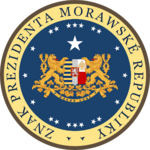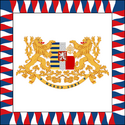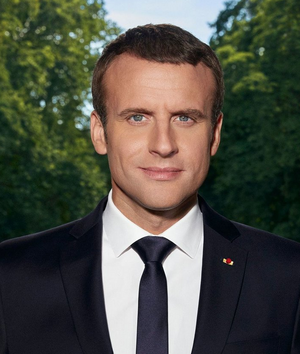President of Morrawia: Difference between revisions
| Line 110: | Line 110: | ||
==Political affiliation== | ==Political affiliation== | ||
Political parties have dominated Morrawian politics for most of the nation's modern republican history. Though the Founding Fathers, especially the Palacký brothers generally spurned political parties as divisive and disruptive, and their rise had not been welcomed when the Morrawian Constitution was drafted in 1857, organized political parties developed in Morrawia already in the mid-1800s nonetheless. They evolved from political factions, which appeared largely in the Imperial Council of Deputies and stayed strong even after the Federal government came into existence. Those who supported the Palacký administration were referred to as ''"pro-administration"'' and would eventually form the Republic Union Party, while those in opposition largely joined the emerging National Democratic Party. | Political parties have dominated Morrawian politics for most of the nation's modern republican history. Though the [[Founding Fathers of Morrawia|Founding Fathers]], especially the Palacký brothers generally spurned political parties as divisive and disruptive, and their rise had not been welcomed when the [[Morrawian Constitution]] was drafted in 1857, organized political parties developed in Morrawia already in the mid-1800s nonetheless. They evolved from political factions, which appeared largely in the [[Imperial Council of Deputies]] and stayed strong even after the [[Federal government of Morrawia|Federal government]] came into existence. Those who supported the Palacký administration were referred to as ''"pro-administration"'' and would eventually form the [[Republic Union Party]], while those in opposition largely joined the emerging [[National Democratic Party]]. | ||
Greatly concerned about the very real capacity of political parties to destroy the fragile unity holding the nation together, Palacký remained unaffiliated with any political faction or party in his first term in office, however he was forced to join the Republican Unionist in his remaining two terms as tensions rose over unity. He was, and remains, the only | Greatly concerned about the very real capacity of political parties to destroy the fragile unity holding the nation together, Palacký remained unaffiliated with any political faction or party in his first term in office, however he was forced to join the Republican Unionist in his remaining two terms as tensions rose over unity in and out of the party. He was, and remains, the only Morrawian president never to be affiliated with a political party, at least for one term. Since Palacký, every Morrawian president has been affiliated with a political party at the time of assuming office. | ||
The number of presidents per political party by their affiliation at the time they were first sworn into office (chronologically) are: | The number of presidents per political party by their affiliation at the time they were first sworn into office (chronologically) are: | ||
| Line 120: | Line 120: | ||
! <abbr title="Number of presidents">#</abbr> | ! <abbr title="Number of presidents">#</abbr> | ||
! Name(s) | ! Name(s) | ||
|- | |||
| style="background:#BC0300;"| | |||
| [[Liberal Party (Morrawia)|Liberal]] | |||
| style="text-align: center;" |11 | |||
| [[Wilhelm Lipowski]], [[Wáclaw Morawċík]], [[Karel Tusar]], [[Klement Sada]], [[Andrej Sada]], [[Mirosław Jaworski]], [[Antonín Worlický]], [[Marcel Palacký]], [[Mariána Turmenská]], [[Tomáṡ Slawinský]], [[Marcel Pelikán]] | |||
|- | |- | ||
| style="background:#1a567e;"| | | style="background:#1a567e;"| | ||
| Line 126: | Line 131: | ||
| [[Pawel Záworský]], [[Eduard Palacký]], [[Karel Abrahám]], [[Antonín Beneṡ]], [[Karl Walmark]], [[Anton Auer]], [[Karel Pawelský]], [[Gustaw Fabián]], [[Josef Sokol]], [[Frantiṡek Denár]] | | [[Pawel Záworský]], [[Eduard Palacký]], [[Karel Abrahám]], [[Antonín Beneṡ]], [[Karl Walmark]], [[Anton Auer]], [[Karel Pawelský]], [[Gustaw Fabián]], [[Josef Sokol]], [[Frantiṡek Denár]] | ||
|- | |- | ||
| style="background:#FBB133;" | | | style="background:#FBB133;" | | ||
| [[Republican Union Party|Republican Union]] | | [[Republican Union Party|Republican Union]] | ||
Revision as of 11:53, 1 July 2024
| President of the Republic of Morrawia | |
|---|---|
| Prezident Morawské republiky | |
 | |
 | |
| Style |
|
| Type | |
| Abbreviation | POTROM (Common) PMR (Morrawian) |
| Member of | |
| Residence | National House |
| Seat | Králowec, F.D. |
| Appointer | Popular vote or via succession |
| Term length | Four years, renewable once |
| Constituting instrument | Constitution of Morrawia |
| Formation | April 20, 1856 |
| First holder | Tristan Palacký |
| Salary | ₮815,000 per year |
| Website | www |
The president of Morrawia, officially the president of the Republic of Morrawia, is the head of state and head of government of the Republic of Morrawia. The president directs the executive branch of the federal government and is the commander-in-chief of the Morrawian Armed Forces.
The power of the presidency has grown substantially since the first president, Tristan Palacký, took office in 1856. While presidential power has ebbed and flowed over time, the presidency has played an increasingly significant role in Morrawian political life since the beginning of the 20th century, carrying over into the 21st century with notable expansions during the presidencies of Karel Tusar and Josef Sokol. In modern times, the president is one of the world's most powerful political figures. As the leader of the nation with the an increasing economy by nominal GDP, the president possesses significant domestic and international hard and soft power. For much of the 20th century, especially during the Era of Civil Wars, the Morrawian president was often called "free world president", given Morrawia´s usual international stance as a supporter of free, independent, democratic and capitalist nations.
Article II of the Constitution establishes the executive branch of the federal government and vests executive power in the president. The power includes the execution and enforcement of federal law and the responsibility to appoint federal executive, diplomatic, regulatory, and judicial officers. Based on constitutional provisions empowering the president to appoint and receive ambassadors and conclude treaties with foreign powers, and on subsequent laws enacted by the Federal Congress, the modern presidency has primary responsibility for conducting Morrawian foreign policy. The role includes responsibility for directing the the Morrawian military, which has a substantial nuclear arsenal.
The president also plays a leading role in federal legislation and domestic policymaking. As part of the system of separation of powers, Article II, Section 5 of the Constitution gives the president the power to sign or veto federal legislation. Since modern presidents are typically viewed as leaders of their political parties, major policymaking is significantly shaped by the outcome of presidential elections, with presidents taking an active role in promoting their policy priorities to members of the Federal Congress who are often electorally dependent on the president. In recent decades, presidents have also made increasing use of presidential directives, agency regulations, and judicial appointments to shape domestic policy.
The president is elected directly through the popular vote to a four-year term, along with the vice president. Under the Thirty-first Amendment, ratified in 1942, no person who has been elected to two presidential terms may be elected to a third. In addition, four vice presidents have become president by virtue of a president's intra-term death, formal removal or resignation. In all, 32 individuals have served 32 presidencies spanning 168 years of history. Marcel Pelikán is the 32nd and current president of Morrawia, having assumed office on April 15, 2024.
History and development
Origins
1876-1900
New Wave
Radical Presidency
Contemporary Period
Legislative powers
Signing and vetoing bills
Setting the agenda
Promulgating regulations
Convening and adjourning the Federal Congress
Executive powers
Administrative powers
Foreign affairs
Commander-in-chief
Juridical powers and privileges
Leadership roles
Head of state
Head of party
Major world leader
Selection process
Eligibility
Campaigns and nomination
Election
Inauguration
Incumbency
Term limits
Vacancies and succession
Declarations of inability
Removal
Circumvention of authority
Compensation
Residence
Travel
Protection
Post-presidency
Activities
Pension and other benefits
Presidential centres
Political affiliation
Political parties have dominated Morrawian politics for most of the nation's modern republican history. Though the Founding Fathers, especially the Palacký brothers generally spurned political parties as divisive and disruptive, and their rise had not been welcomed when the Morrawian Constitution was drafted in 1857, organized political parties developed in Morrawia already in the mid-1800s nonetheless. They evolved from political factions, which appeared largely in the Imperial Council of Deputies and stayed strong even after the Federal government came into existence. Those who supported the Palacký administration were referred to as "pro-administration" and would eventually form the Republic Union Party, while those in opposition largely joined the emerging National Democratic Party.
Greatly concerned about the very real capacity of political parties to destroy the fragile unity holding the nation together, Palacký remained unaffiliated with any political faction or party in his first term in office, however he was forced to join the Republican Unionist in his remaining two terms as tensions rose over unity in and out of the party. He was, and remains, the only Morrawian president never to be affiliated with a political party, at least for one term. Since Palacký, every Morrawian president has been affiliated with a political party at the time of assuming office.
The number of presidents per political party by their affiliation at the time they were first sworn into office (chronologically) are:
| Party | # | Name(s) | |
|---|---|---|---|
| Liberal | 11 | Wilhelm Lipowski, Wáclaw Morawċík, Karel Tusar, Klement Sada, Andrej Sada, Mirosław Jaworski, Antonín Worlický, Marcel Palacký, Mariána Turmenská, Tomáṡ Slawinský, Marcel Pelikán | |
| Republican | 10 | Pawel Záworský, Eduard Palacký, Karel Abrahám, Antonín Beneṡ, Karl Walmark, Anton Auer, Karel Pawelský, Gustaw Fabián, Josef Sokol, Frantiṡek Denár | |
| Republican Union | 5 | Tristan Palacký (second and third term only), Boleslaw Keiser, Edward Soukup, Jan Rýnský, Adrian Nowý | |
| Radical Populist | 3 | Rostislaw Nowotný, Antonín Sád, Christoph Steinmayer | |
| National Democratic | 2 | Benedikt Augustýn, Herbert Klimeṡ | |
| No party | 1 | Tristan Palacký (first term only) | |
Timeline of presidents
The following timeline depicts the progression of the presidents and their political affiliation at the time of assuming office:

